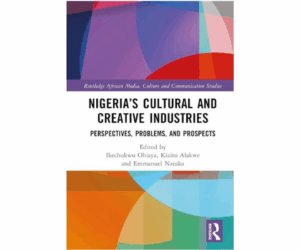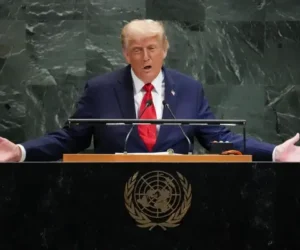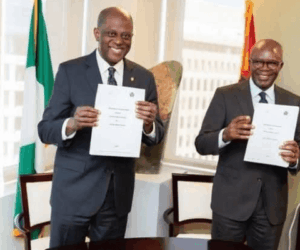Many of Nigeria’s policy and economic analysts have always blamed the World Bank/IMF for Nigeria’s economic failures. Many of them point to the 1986 Structural Adjustment Programme, which prescribed the austerity measures. Others point to President Tinubu’s present economic reforms. They say that the World Bank supported the removal of the petroleum subsidy and the harmonisation of the multiple foreign exchange regimes. During the Annual World Bank/IMF in October 2024, Mr Abebe Selassie, the IMF’s Africa Region Director, denied that IMF/World Bank played any role in the removal of fuel subsidies and the harmonisation of the foreign regime by the Federal Government of Nigeria. On 26th October, 2024, the Nigerian Labour Congress issued a statement in response to Mr. Abebe Selassie’s denial. In that statement, they stated among other things that “It is pretentious and truly too late to begin to deny complicity because we warned the government about the consequences of implementing IMF and World Bank-driven policies….. Once again, we call on the World Bank and IMF to remove their knees from our necks so that we can breathe as a nation. They have become the major problem we have as a nation and we may be forced to soon demand that they leave Nigeria entirely as their policies have continued to undermine our economy and sabotage the people and the nation”.
Another voice and a weighty one to this singsong is that of Professor Ibrahim Gambari, the former Chief of Staff to President Muhammadu Buhari and Nigeria’s former Permanent Representative to United Nations. He was speaking at the Realnews 12th Anniversary Lectures in Lagos in November, 2024. This was reported in Thisday Newspaper of 20th November, 2024 by Wale Igbintade. Prof Gambari was quoted as saying “It’s time we define our problems and design ways to solve them. If the IMF and World Bank’s prescriptions had been correct, we should be living happily today but we are not. To make matters worse, the World itself is changing and the international community is evolving, global relationships and norms are changing”. At the 4th Intra African Trade Fair held in Algiers, Algeria between 4th and 10th, September, 2025, Former President Olusegun Obasanjo declared that, “The World Bank, IMF, the United Nations, even WHO, these institutions were established before most African countries gained independence. They were not designed for us”
At the global level, there has been criticisms on World Bank’s policies and their adverse impact on developing countries. In 2004, Dr Asad Ismi published his article on “Improverishing a Continent: The World Bank and IMF in Africa. Prof Joseph Stiglitz, a Nobel Prize winner in Economics and the former Chief Economist of the World Bank criticized the World Bank’s support for “Washington Consensus” a set of policies that promote stabilization, liberalization and privatization of the economy as damaging because of its emphasis on deregulation. Instead, he opined that policies should help countries develop the right regulatory structure. He argued that a major lesson from the financial crisis that erupted in 2007-2008 is that the state has a crucial role to play in economic development both in preventing crises and implementing adequate measures to avoid an amplifier effect turning into depression.
In July, 1944, a year before the end of the World War 11, the United Nations Monetary and Financial conference was held at Mount Washington Hotel in Bretton Woods, New Hamphire, USA. 700 delegates from 44 countries attended the conference. The objective of the conference was to fashion out a framework for post-war reconstruction and multilateral economic collaboration. The achievement of the conference was the founding of the World Bank and IMF commonly referred as Bretton Woods Institutions. The purpose of setting up the World Bank was to rebuild Western Europe and Japan after a devastating second world war. However, the US later realized that what Europe needed was not loans but reconstruction gifts and grants. Hence the Marshall Plan was promoted which replaced the World Bank in the role to reconstruct, rehabilitate and restore the economy, psyche and stability of Europe. About 13.3Billion Dollars was spent by USA from 1948-1951 under the Marshall Plan to reconstruct seventeen European Nations.
The World Bank has since metamorphosed into a global institution that promotes long term economic development, poverty reduction and global prosperity by providing knowledge, financial and technical assistance to enable countries develop, execute reforms and turnaround their economies.
At the time of its commencement of operation in 1946, only three African countries of Egypt, Ethiopia and South Africa were among the 38 original members. Most of the Sub-Sahara African countries including Nigeria were still under colonial rules.
Since 1958, the World Bank has provided Nigeria with low interest rate loans and grants through the International Development Association (IDA) and International Bank for Reconstruction and Development (IBRD). The sub-saharan African countries including Nigeria and other third countries came under the close searchlights, scrutiny, monitoring and surveillance of the World Bank and IMF due to the economic crisis of the late 70s, 80s and 90s. These countries were plunged into deep economic and balance of payments crisis due to the poor management of the oil and commodities boom of the early 70s.
Nigeria discovered oil in 1956. It commenced the export of its total production of 5100bpd in 1958. By 1972, its production level has reached 2millionbpd which placed it as the 10th largest global producer. When the Arab-Israeli crisis started as a result of the 5th October, 1973 Yom Kipper attack on Israel by Egypt and Syria, the US and its allies in Europe opposed the attack. The Arab world was miffed by the stance of US and its allies. They retaliated by imposing oil embargo on the western world who depended on the Arab oil for their industrial and domestic use. The result was a dramatic rise in oil price. From a paltry price of $3pb, the price shot up to $12 in December, 1974.Nigeria entered into an oil boom. This was about 400% increase in price. Money was no longer the problem for Nigeria but how to spend it. From an oil revenue of a mere $200million in 1970, Nigeria grossed a revenue of $32Billion between 1973 and 1978. The average revenue was about $6Billion per annum. In 1979 alone, Nigeria earned $16Billion while in 1980, it got $24Billion revenue from the sales of oil. As a result of the swell in its revenue, the exchange rate of its currency, Naira, became one of the strongest in the world, exchanging 80k to $1. With the increase in petrodollars wealth, Nigeria went into a spending spree, importing all manner of goods and services to the level of importing took picks. Life became a roller coaster for the government and people of Nigeria. It is a fact that many developmental projects were executed and urbanization was expedited in this period. However, the country embarked on many white elephant projects that had no economic impact or multiplier effects on the economy. Agriculture which before then was the major foreign exchange earner was abandoned and we became dependent on oil revenue. Nigerian citizens abandoned productive vocations, skills and occupations in the real sector to become contractors and suppliers of mainly imported goods and services. The local industries and manufacturing sectors were put out of business and were replaced by imported items which created jobs and skills in foreign lands.
By 1982, the global oil market had stabilized with the return of peace in the Middle East and its concomitant increase in supply and lesser demand. The result was a fall in oil price in the global market. Nigeria earned $9.6Billion in 1982 compared to $24Billion it earned in 1980. Oil contributed about 19% to Nigeria’s revenue in 1970. By 1974, it contributed 80% and since 1989 till date, it has been contributing nothing less than 80%. From 1972 till date, Nigeria has depended on oil revenue for the sustenance of its economy. An upward swing in global price entails relief and joy while a downward plunge brings sadness and agony.
In 1982, the economy was on its knees. The civilian administration of Alhaji Shehu Shagari had issued import license which plunged the country into a trade deficit of about 30 billion dollars. The economic condition of the country at that time is amply explained in the recently published book; “A journey in Service” by Former military President Ibrahim Babangida inter alia; “Scarcity of essential goods had remained the order of the day from our intervention in December, 1983. The stores of the National Supply Company had been forced open by the government and the contents auctioned off to the people. There is no alternative to replenish the stocks. Acute scarcity was nationwide. Endless queues continued at distribution centres for essential goods like sugar, cooking oil, baby formula and grains. Reports from major population centres indicated that soldiers and police officers were ill-treating people in these queues even if they could not be assured of getting the supplies even after waiting for hours”
Elsewhere in the book, the author wrote “By mid-1985, we needed more foreign exchange to pay for more than three months instead of the minimum international requirements of six months. We needed funds. We applied to the International Monetary Fund and World Bank for balance of payments assistance loans. Both multilateral institutions came back with identical feedback. A string of conditionalities were attached to the availability of short and medium-term facilities”The author went further to justify the conditionalities, “In any event, the conditionalities prescribed by the IMF amounted to rational economic measures that any sensible country caught in our situation needed to adopt to tidy over its economic woes”. The above scenario was the circumstance under which the Bretton Woods Institutions came to bail us out of the economic quagmire we plunged ourselves into. Today, they are being blamed for our mistakes.
Since 1985, Nigeria has continued to borrow and be subjected to the lending terms of the World Bank and IMF. As at September, 2024, Nigeria was indebted to the World Bank Group to the tune of $17.322Billion which accounts for 40.25% of Nigeria’s external debt stock. Despite the hues and cries by some of our policy analysts about the World Bank, the Bank since the structural adjustment programme period helped Nigeria in restructuring and transforming its economy. The deregulation of the commanding heights of the economy such as the oil and gas sector, banking sector, telecommunication sector, Aviation sector, broadcasting sector, privatization of government owned enterprises has been achieved with the advice, sometimes by the funding, supervision and monitoring of the World Bank. One wonders what our economy would be without the banks like Zenith, GTB, First Bank, ACCESS, UBA, STANBIC, FIDELITY and other private sector players such as Dangote Group etc. These institutions are products or beneficiaries of deregulation. No one gives credit to the World Bank for its invisible hand in the making of these products of deregulation.
The long depression in oil price witnessed an upward swing from 1999 at the beginning of the return of democracy. From the low price of $10 in 1998, it started appreciating to a record high of $147 in 2008. In this period of high prices and boom, 1999-2008, Nigeria created a fund known as Excess Crude Account. Nigeria went further to promote a sovereign wealth fund being managed by Nigeria Sovereign Investment Authority. However, the machinations and agitations of State Governors under the Nigerian Governors Forum insisting on, these surpluses above the budgeted price benchmarks on oil revenue, being shared according to constitutional provisions did not allow these funds to accumulate for appropriate mutual beneficial investment. On the other hand, due to the vagaries in oil prices, the accumulated surpluses are most times used to fund budget deficits during periods of low prices below budgetary price benchmarks.
The World Bank is a bank as well as a development agency focused on poverty reduction. As a bank, its loans are given on stated conditions. Every loan has its accompanying conditions that must be fulfilled prior to disbursement and during the target project execution. The International Development Association is the concessional lending arm of the World Bank Group. It offers low interest or interest -free loans and grants to the world’s poorest nations. Its loans come with long maturities and generous grace periods. Most developing nations including Nigeria go for World bank loans when they are in economic crisis. In granting these loans, the Bank stipulates its conditions that must be complied with. Such conditions are in the form of reforms to the economic and social policies and structures that, in the first instance, precipitated the economic crisis. Usually, the compliance to the reforms are in the hands of the local managers of the economy. Once these loans are granted, the World Bank managers monitor and exercise advisory role on the utilization of the loans or project implementation. There is usually economic and political implications to borrowing from the bank. Countries that are in economic depression cannot eat their cakes and still have it.
From time to time, the World Bank issues an opinion or statement on the economic status, state or economic outlook on countries and global economy to help sovereign managers of National economies on the right path to growth and prosperity. During the 30th Nigerian Economic Summit held on 14th October, 2024, the World Bank Chief Economist, Dr Indermit Gill advised that Nigeria must maintain its present economic reforms for the next 10 to 15 years to reclaim economic dominance not only in Africa but in the world. This paper was published in the Financial Times of 16th October, 2024. Recently, the World Bank highlighted that the Federal government of Nigeria’s conditional cash transfer programme did not reach millions of Nigerians who need urgent economic relief. A loan of $800Million was secured from the World Bank to reduce poverty of the vulnerable poor of the poor. In other words, the World Bank is saying that this loan is not being properly applied. The World Bank has just released the global growth forecast which states that trade tensions will heighten uncertainty in 2025. Opinions like the ones highlighted above help to create roadmaps for sustainable economic management for sovereign nations.
In retrospect, on 22nd January, 1997, the Nigerian Economic Society held a one-day seminar on; “Why economic policies failed in Nigeria”. In his presentation which has the same title as the theme of the conference, a former Director-General of NISER and a foremost Nigerian Economist, Prof Dotun Philips submitted that economic policies failed in Nigeria over the years for non-economic reasons. He identified the ultimate goals of an economy to be to constantly improve the economic welfare of the vast majority of the people in terms of of incomes, prices, jobs, supply of wide-ranging basic goods and services, economic equity etc.
He identified the non-economic factors responsible for the failure of economic policies as non-accountable governments, pre-occupation with tenure and security, corruption, unstable polity, over-centralisation and forcible uniformity, infallibility syndrome, decision-makers love for TINA, untimeliness; considerable haste or considerable delay, abhorrence of systems, square pegs in round holes, scant attention to the ultimate goals of the economy, often inappropriate theoretical base, relative lack of holistic and multidisciplinary approaches, inadequate data, foreign debt burden, culture of escapism, policy instability, ethnic divisiveness and distrust etc.
Twenty-eight years after this seminar, these factors are still bedeviling the economic policies, economic development and the general economy. The World Bank has contributed a lot to Nigeria’s economic development in terms of funding many of the gigantic projects in Nigeria, capacity building, gauging and issuing outlooks on the direction and shape of the economy, economic knowledge sharing, poverty alleviation, economic management. The World Bank is assisting the subnationals, the States in Nigeria for transparency through the States Fiscal Transparency, Accountability and Sustainability (SFTAS) Programme. In another vein, a number of the eggheads who have helped to rescue our economy from the brink of collapse such as Dr Ngozi Okonjo-Iweala, Dr Mansur Muhtar, Miss Arunma Oteh etc, all came from the World Bank. The present administration has benefitted from World Bank loans. A local newspaper, Daily Trust in its frontpage headline of 2nd April, 2025 wrote; FG borrows N13.2trn from World Bank in 20 months with riders, Fresh $1.1bn loan approved in one week as debt profile hits N142trn. Nigeria is the third largest debtor to the World Bank’s International Development Association with outstanding obligations of $18.2Billion as June 30, 2025. Another rider states; Multilateral loans vulnerable to corruption opined Experts. The fact is that we are not giving the World Bank enough credit for its contribution to our economic development. Instead we blame them.
We should rather blame ourselves, our economic managers and advisers for the lost opportunities, mismanaged resources, poor planning and high level of corruption within our systems that have plunged our country into economic stagnation. This author is not unaware of the enormous influence which the World Bank exercises over economic policies and development in developing economies such as Nigeria. The fact remains that sovereign nations such as Nigeria have the inalienable rights to choose and implement those economic policies that will lift them out of economic depression to economic prosperity. The Asian Tigers did just this. Unfortunately, our leaders choose to plan and implement those policies that advance their selfish economic agenda and leave the mass majority of Nigerians in multidimensional poverty.
.Dr. Umunnaehila is a Chartered Stockbroker, a commodities broker, a Financial, Economic and Management Consultant who holds a Ph.D in Business Administration from Babcock University, Nigeria. He is the CEO, Allwell Brown Consulting Ltd, an author, a seasoned scholar and Investment trainer. He is also a Fellow of Chartered Institute of Stockbrokers (CIS), Member, Chartered Institute of Securities and Investment (CISI), Member, Capital Market Academics (CMA) and a licensed Securities Dealer with Securities and Exchange Commission.









